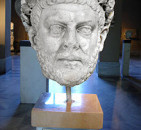Diocletian was Roman emperor from 284 to 305. Born to a family of low status in the Roman province of Dalmatia, Diocletian rose through the ranks of the military to become cavalry commander to the Emperor Carus. After the deaths of Carus and his son Numerian on campaign in Persia, Diocletian was proclaimed emperor. The title was also claimed by Carus' other surviving son, Carinus, but Diocletian defeated him in the Battle of the Margus. Diocletian's reign stabilized the empire and marks the end of the Crisis of the Third Century. He appointed fellow officer Maximian as augustus, co-emperor, in 285.
Diocletian delegated further on 1 March 293, appointing Galerius and Constantius as caesars, junior co-emperors. Under this 'tetrarchy', or "rule of four", each emperor would rule over a quarter-division of the empire. Diocletian secured the empire's borders and purged it of all threats to his power. He defeated the Sarmatians and Carpi during several campaigns between 285 and 299, the Alamanni in 288, and usurpers in Egypt between 297 and 298. Galerius, aided by Diocletian, campaigned successfully against Sassanid Persia, the empire's traditional enemy. In 299 he sacked their capital, Ctesiphon. Diocletian led the subsequent negotiations and achieved a lasting and favorable peace. Diocletian separated and enlarged the empire's civil and military services and reorganized the empire's provincial divisions, establishing the largest and most bureaucratic government in the history of the empire. He established new administrative centers in Nicomedia, Mediolanum, Antioch, and Trier, closer to the empire's frontiers than the traditional capital at Rome had been. Building on third-century trends towards absolutism, he styled himself an autocrat, elevating himself above the empire's masses with imposing forms of court ceremonies and architecture. Bureaucratic and military growth, constant campaigning, and construction projects increased the state's expenditures and necessitated a comprehensive tax reform. From at least 297 on, imperial taxation was standardized, made more equitable, and levied at generally higher rates.
- Kalbos dalis: proper noun
- Pramonės šaka / sritis: History
- Category: European history
Other terms in this blossary
Kūrėjas
- KSGRAM
- 100% positive feedback
(Athens, Greece)





